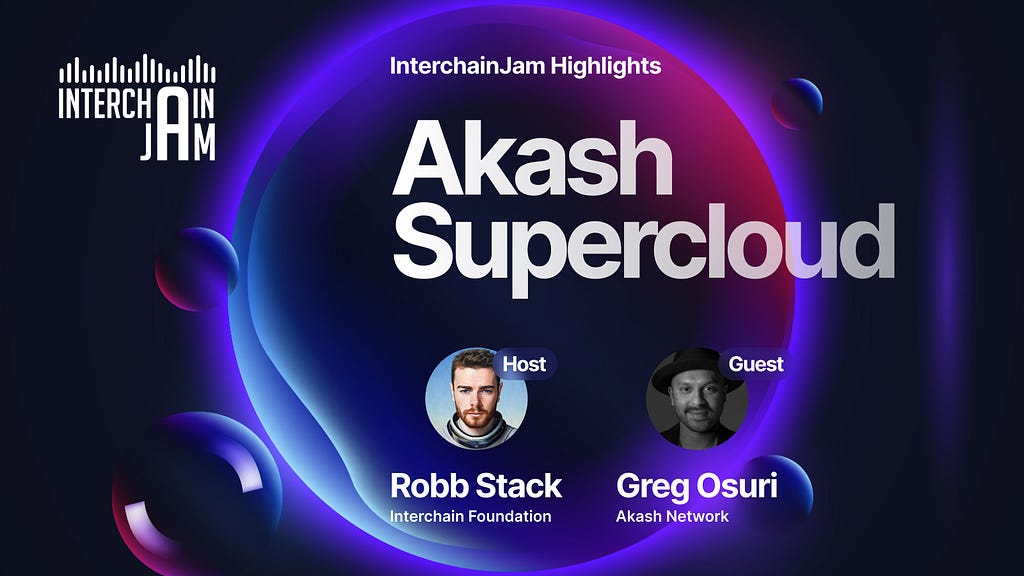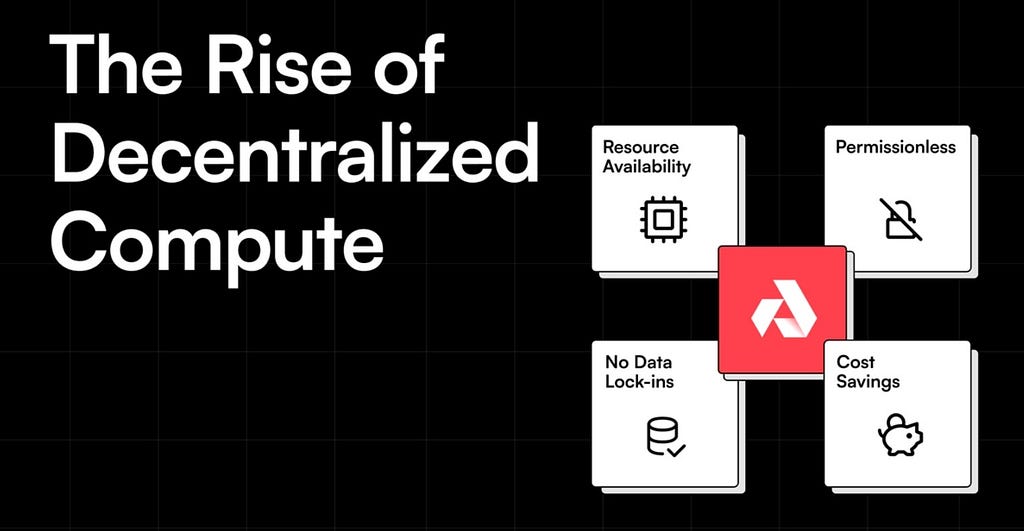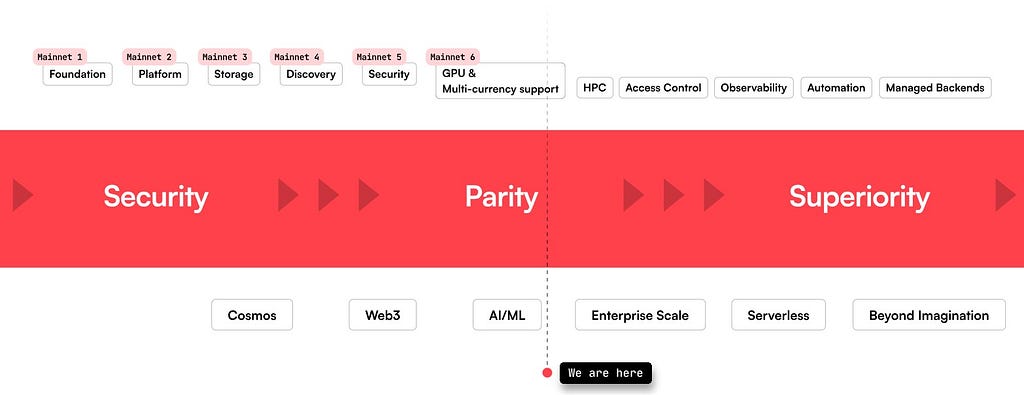Latest news about Bitcoin and all cryptocurrencies. Your daily crypto news habit.
Interchain Jam Highlights — Akash Supercloud

Interchain Jam Highlights — Akash Supercloud recaps the live X session hosted by the ICF’s Robb Stack. As one of the earliest projects to develop with Cosmos SDK, IBC, and Tendermint Core (now CometBFT), Akash Network is also the interchain’s first DePIN project, pushing the boundaries of the ecosystem and beyond with the world’s first open ‘supercloud’. Let’s hear about Akash’s fascinating story, the real-world problems it’s solving, and how it’s leveraging the Interchain Stack to support mission-critical infrastructure.
Getting to Know the Interchain — Akash Network
Akash Network is a pioneering decentralized cloud computing platform disrupting the “autocracies and oligopolies” of traditional centralized cloud infrastructure. By leveraging blockchain technology through its decentralized marketplace, Akash connects server owners with users who need computational resources and hosting applications.
The Akash Marketplace operates on top of the Akash Layer 1 network underpinned by the Interchain Stack enabling seamless transactions and state changes using a Delegated Proof-of-Stake (DPoS) consensus mechanism. Founded by Overclock Labs in March 2018, Akash has come a long way since its inception as a traditional multi-cloud deployment platform. Through the vision of its co-founders, Greg Osuri and Adam Bozanich, Akash is democratizing access to cloud computing resources while promoting decentralization and innovation.

Challenging the ‘Oligopoly’ of Cloud Providers
The idea for Akash, co-founder Greg Osuri explains, stemmed from the need to challenge the expensive and powerful “oligopolies” in the cloud space, which is dominated by a handful of players including Amazon, Microsoft, and Google. These behemoth companies amassed data centers before the dotcom crash and sought ways to monetize these servers after demand fell off a cliff. “That’s really the birth of the cloud,” he says. With the emergence of Amazon Web Services and the popularity of the cloud model, these companies accumulated enormous power and “built massive moats for any new entrants and strong pricing power.”
He points to a study called the Trillion Dollar Paradox that lists the cloud as one of the most significant platform shifts in the history of computing, revealing that for one dollar of every spend from online companies like Netflix or Sana, about 50 cents goes to a cloud provider. “It’s crazy, right? All of us, our society as a whole, pay a cloud tax to this opaque layer that we have no idea what happens, and on top of that, there’s a lot of control and stifling of business models, especially for open source… Oligopalization leads to bad things in general. It’s bad for free markets,” Greg states.
Adam and Greg sought to address this problem and enable free and open markets in the cloud space with an open supercloud, which is “the idea of decoupling the cloud provider from the user of the cloud so that your applications can be deployed on any cloud and still work as it would work on a single cloud… The name Akash means sky in Sanskrit, where the clouds are created. That’s where the name comes from,” he says. Akash costs one-tenth of Amazon’s running costs. “If you want to remove dependency on a person, Akash is the solution.”
Enabling the Decentralized Growth of AI

Beyond connecting underutilized data centers with users wanting to leverage their supply, Akash is fostering the decentralized growth of AI by democratizing access to specialized hardware, such as GPUs, that are essential for AI training and development, and addressing the supply chain issues caused by increased demand for these chips. Traditional cloud providers prioritize large customers over smaller ones, leaving startups, students, and universities underserved. Akash is leveling the playing field by allowing companies and individuals to lease their hardware on the platform, enabling AI enthusiasts to access the computing power they need.
This has led to success stories like Brev.dev, which got its start on Akash before being acquired by NVIDIA, and empowering individuals like a student at Columbia University who turned to Akash when traditional cloud providers couldn’t provide the necessary resources. “Brev is a massive success story, but there’s also a failure story,” Greg says. Banana.dev ultimately shut down due to an inability to acquire the necessary computing resources, as the company wasn’t aware of Akash. “We are moving AI forward,” he says:
“Akash is the difference of life and death for companies at this point.”
Why Akash Chose the Interchain Stack
Control Over the Project’s Development
While Akash was founded in 2018, Greg explains, “Our story with Cosmos SDK goes way back before the interchain.” They began working on Akash “about nine years ago” and it started as a centralized service before the team realized the limitations in terms of scalability, creating a bottleneck with thousands of computers. Greg was inspired by Bitcoin and the “permissionless membership” it enabled and they turned their gaze to blockchain technology. Akash launched its first version in Ethereum until:
“Cryptokitties launched and crashed the network and we realized that Ethereum is not the way forward for us.”
That’s when they decided to take control of their own development and launch as a Layer 1 network.
Open-Source Ethos
Greg and his co-founder Adam have strong open-source backgrounds making many contributions to open-source platforms like Kubernetes, Terraform, and Docker. They’re passionate about open source because it attracts the best talents from around the world to contribute to improving a product. One of the main reasons Akash began contributing to the interchain was its open-source ethos.
“We started contributing to [the interchain] because we use the product, not because someone paid us. Incentive through usage is the best type of incentive. And Cosmos had the community and the culture and the core base. That was very attractive for us.” He goes on to say:
The interchain is “the only product that really works for building appchains today. Akash had to be open-source so anyone could contribute to it… We grew up in open source, we grew up in the internet, and we want to keep it that way.”
Functionality to Support DePIN Growth
Greg is particularly inspired by DePIN projects because “Unlike meme coins and NFTs, DePIN actually supports the real world and it’s an application that can bring the decentralization of crypto into the real world.” However, not every ecosystem or tech stack is suitable for supporting mission-critical DePIN infrastructure. Despite the billions of dollars being poured into DePIN networks, Greg explains that when the latest AI-powered large language model Lama 3.1 was released, Akash was the only DePIN computation network able to host it.
“Akash is the only one that can host that model. Other DePIN computation networks out there with all this hype and thousands of GPUs and all these massive revenues, none of them can host this model. So it makes you wonder, why? The reason really comes down to this…
“I think Cosmos SDK provided Akash with an incredible advantage when it comes to functionality. Most networks out there, including Solana, are not primed or ready for DePIN.”
No Load Sharing with Other Applications
Why can’t other networks support the rapidly evolving DePIN space valued at $2.2 trillion today? According to Greg, “It really comes down to sovereignty versus shared state. You can draw a lot of analogies to the web2 traditional world, where you have shared databases versus dedicated databases. In shared databases, the underlying database is shared amongst different applications. So the load is also shared amongst these applications. If one application has a massive load, it degrades the performance of other applications.”
When you build in a shared-state environment like Ethereum or Solana, you are at the mercy of network bloat and loading times shared with other applications.
“Solana has a lot of meme coins, a lot of DeFis, a lot of airdrops, all that stuff, so every time there’s a massive overhyped launch, it slows down the entire network to a degree that makes it impossible to function… not to single out Solana, I’m talking about shared state in general.”
Shared state development environments are unsuitable for DePIN projects that provide mission-critical public utilities that simply cannot fail. “These utilities are required to have high reliability and function under duress, they are required to be a public utility, just like water and electricity. That’s what makes them powerful and why they have these massive valuations…
“If a meme coin launch is going to take down a public utility, what kind of reliability are we talking about?”
Reliability, Scalability, and Stability
The Interchain Stack is critical for supporting DePIN projects requiring continuous uptime because of its “reliability and stability.” Greg says this is the competitive advantage that DePIN projects need. “I know Akash will work. I have so much confidence because Akash never goes down.” He points to the Terra/LUNA collapse in 2022 and says that, while most people talk about “the bad stuff that happened,” the lesser-told story is that the chain never failed.
“During the crisis, during the collapse, the chain experienced a lot of stress. With people trying to pull out their money, the chain never went down. That’s something we don’t talk about much…
“The reliability, scalability, and stability that the [Interchain Stack] provides is incredible, especially if you’re a DePIN network, especially if you’re a mission-critical public utility. That’s the biggest competitive advantage Akash has over the others, because of Cosmos SDK.”
A Scalable Interoperable Ecosystem
Akash was among the first chains to adopt IBC, enabling it to connect with an ever-expanding ecosystem of interoperable blockchains. When asked how he sees the future of the interchain, Greg replies that he would like to see it scale through interoperability. “There are multiple ways you can scale, but I think interoperability is an incredible way to scale systems… You need an unbounded limit. You can’t have a hard limit, and the way you remove the limit is to have a clear separation of concerns and make them interoperable.” He continues:
“I see a world where there are heterogeneous chains, each having their own purpose, each having their own limitations, their own parameters, all interoperating with each other and that’s how you’re going to scale. You won’t scale when there’s a centralized controller or a sharding mechanism that is still a pessimistic manner. You’re going to scale when you have an optimistic network where any network can essentially function without depending on other networks but interdependent on each other… Interdependence is a lot better than codependence.”
Modularity for Custom Development
Akash is leveraging Cosmos SDK’s modularity to provide an enhanced user experience through account abstraction. For many non-crypto users, the barrier of connecting a wallet and signing up for an account at a centralized exchange to acquire AKT tokens is simply too high. After monitoring user behavior on the Akash platform, the team identified this point of friction and leveraged Cosmos SDK’s Fee Grant module to develop a feature that provides an in-browser wallet for users without requiring them to install a separate Keplr wallet or exchange private keys.
They can easily access Akash’s decentralized computing resources by automatically creating a wallet when they visit the Akash website, without needing to back up keys or exchange private information. This streamlined onboarding process enables users to deploy on Akash within 30 seconds rather than 30 minutes, removing the barriers to entry associated with traditional wallet installation and acquiring AKT tokens. This solution has helped increase adoption rates without sacrificing any core principles. Greg states:
“We achieve all the things we need to achieve from a user experience standpoint without sacrificing decentralization. Now, that’s a big deal.”
What’s Coming Up for Askah?

Greg would like to see greater adoption of AI in the interchain with Akash increasingly used as the foundation layer. The platform is also seeing an increase in use cases from the defense industry that can fork a version of the software to create a private network and aggregate compute resources from different Department of Defense (DOD) agencies.
Akash validators now support multi-currency settlement via IBC, and the platform seeks increasing traction in this area, whereby a storage protocol like Jackal pays for Akash’s services in its native token and Akash pays Jackal for storage in AKT. “I think that’s an incredible use case,” Greg says, “we can demonstrate that interoperability works.” He also wants to be “more aggressive in enabling stable currency payments using Noble USTC.”
As a DePIN network, Greg would like to see more DePIN projects in the interchain leveraging Askah’s resources to bootstrap their ecosystems. “We have this massive network now with incredible price points that is very attractive for DePIN projects… There’s a lot going on in this ecosystem right now.”
Akash is also gearing up to implement several new features, including a service-based model where users can pay for various services such as databases, production nodes, load balancers, and more, provided by third-party companies. The service marketplace on Akash will also feature competition among multiple providers, allowing users to choose the best option for their needs. Akash’s on-chain funding enables developers to apply for funding to build new features or improve existing ones. Greg enthuses:
“It’s open to everybody to work on. It’s fully permissionless and every aspect of Akash is open source… So if you have ideas to improve Akash, please come talk to me.”
Wrapping It Up
You can keep up to date with Akash Network by following them on X, joining the team on Discord, or contributing to its GitHub repo. Interchain Jam will be taking a break over August but you can follow along with the highlights of previous episodes here and find out more about the inspiring projects pushing the interchain forward.
Interchain Jam Highlights — Akash Supercloud was originally published in Interchain Ecosystem Blog on Medium, where people are continuing the conversation by highlighting and responding to this story.
Disclaimer
The views and opinions expressed in this article are solely those of the authors and do not reflect the views of Bitcoin Insider. Every investment and trading move involves risk - this is especially true for cryptocurrencies given their volatility. We strongly advise our readers to conduct their own research when making a decision.